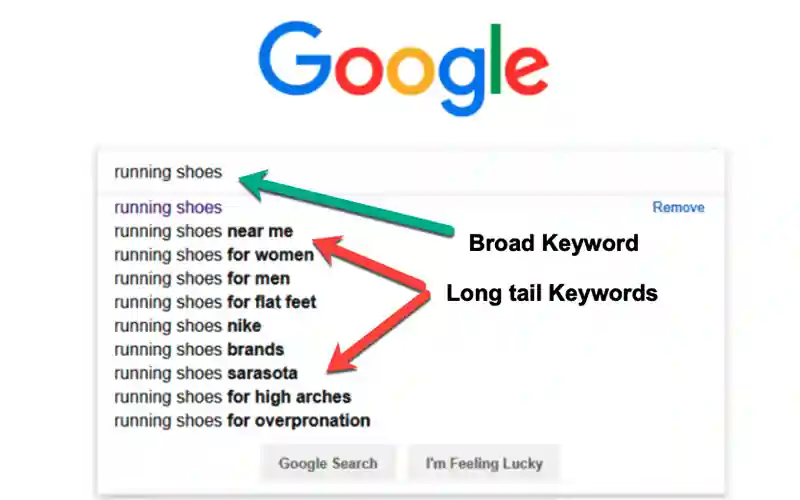
Content Index
- Introduction
- Use of Voice Search Technology in the Present Scenario
- Why is Google Voice Search gaining popularity?
- Why should your Online Business get bothered about Voice Search evolution?
- 7 Ways to Make your Website Voice Search Friendly For Instant Users
- 1. Make your website load faster
- 2. Structure content bearing user intent in mind
- 3. Optimize for specific search engines or all?
- 4. Place bets on long-tail keywords
- 5.Optimize your “Google My Business” Listing
- 6. Make use of Schema Metadata
- 7. Optimize your Ad campaigns for Searches including “Near Me”
- Final Thoughts on 7 Ways to Optimize Website for Voice Search in Google!
Introduction
Voice search is no longer an alien term in SEO, as it is constantly rising and even the majority of webmasters are preparing their websites for all the nature of voice searches.
But is voice search SEO really that important?
Yes, it is because:
- Every 1 in 2 customers uses voice search technology daily either to order that favorite cheesecake online or to shop for some fancy decor pieces.
- 72% of users now have a voice-activated speaker that is a routine part of their online to offline tasks.
- 50% of online searches are to be done from human voices.
But why voice search in Google or other voice assistants or speakers is rising so high:
- Because people want quick answers at lightning speed.
- Because speaking is much faster & easier than running fingers on keypads.
- Because there are 2.71 billion smartphone users, out of which, the majority of them find voice search as an easy way for on-the-go mobile searches.
- Because voice assistants and speakers are effective as they help with routine tasks.
Before shedding some light on how to optimize a website for voice search in Google via the help of a voice search SEO agency, let’s understand the landscape of voice searches first. Let’s start with how voice searches are used today, what is voice engine optimization, and why you should get bothered about voice search evolution.
Use of Voice Search Technology in the Present Scenario
Voice searches have definitely improved in past years due to the major enhancements in the AI and Machine Learning components.
AI-powered Google speech assistant has worked a lot on improving its understanding of the English language in human speeches - the accuracy rate has increased and reached to 95%, while its word error rate is just 4.9%.
Google’s CEO Sundar Pichai demonstrated in Google’s I/O (Innovation in the Out) 2018 that how the AI-powered Google speech assistant is now able to understand the nuances of each and every conversation.
These kinds of meticulous changes justify the meteoric rise of voice-activated technology.
Voice searches are used in daily life:
- Quite a lot of smart devices such as phones, tablets, TV, speakers, temperature to lightning controls are running greatly on voice search.
- Several universities are linking smart speakers to student’s university accounts to help them in their routine tasks like scheduling class for the day, setting alarms before classes, getting tuition fee information, etc.
- Even Marriot has teamed up with Amazon to launch Alexa for the hospitality sector - so that it can act as a virtual concierge to fulfill guests’ tasks like - checking out from the hotel, calling, finding nearby attractions & tourist spots, ordering towels, controlling the room temperature and lighting, etc.
Why is Google Voice Search gaining popularity?
Primarily, due to ease in use as compared to typing the consumption of voice technology in devices like Android mobile devices and smart home technology such as Amazon’s Alexa has been gaining popularity.
Do you know an average adult can just write 40 words per minute but can speak 150 words within the same time?
The second reason behind their popularity is their ability to absorb in the daily routine of people, Amazon’s Alexa has greatly ushered the customers to bring “smart home revolution”.
Why should your Online Business get bothered about Voice Search evolution?
Because optimizing for voice search is quite different from that of traditional text-based searches.
They say the first result on SERP gets 35.35 % of clicks. In the case of voice search, you get only the top 3 results over mobile screens and one in case of smart speakers. In voice searches, ranking on top is just everything.
The 50% of online searches are all set to be done via voice, so it is high time for brands to get ahead of the curve by turning their websites friendly for voice search in Google.
Just imagine how the competition soon will get fierce. Imagine you being the one without any preparation and there is only one spot over voice results?
What Does Voice Search Optimization Mean?
Voice search optimization (VEO) is a refined term for voice-based search engine optimization.
VEO means optimizing the website’s content, location, and other information over the web in a way to increase its position in the voice search results.
Voice search is a new way to find on-the-go information and resources online. VEO is just like SEO - but the only 2 differences between them are - one, the competition in voice searches is tough, second, in voice searches you require optimizing content for the human speeches and their intonation.
So where do these Voice-activated devices rely on to help with users’ local searches?
For the local search over the web:
- Amazon’s Alexa is powered with Yelp.
- Google voice assistant takes help from Google Maps.
- Siri bases its information on Apple Maps.
- While Cortona (an in-built search feature for Microsoft computers) is driven by Bing.
7 Ways to Make your Website Voice Search Friendly For Instant Users
You must be wondering how you need to optimize your website for voice searches. If you are already bracing with strong SEO measures, chances are you will have to do only little extra efforts to make your site friendlier to voice searches. Here is what you need to do via the help of a voice search SEO agency.
1. Make your website load faster
Website speed is one of the most important factors to get good voice search ranking - because users behind voice searches are the ones who are looking for information on-the-go.
Even Google now is ensuring mobile search ranking based on a website’s loading speed.
The best time for the website’s landing page loading has been prescribed as under 15 minutes by experts.
If your website is not ranking well on mobile search results due to explainable website speed issues, this will indirectly snatch your voice search ranking opportunities as well.
2. Structure content bearing user intent in mind
If you have ever done a voice search from your mobile, then chances are you must be knowing what specific information you are looking for through that search.
If you are doing a local search for a business, store, or any product, you would be willing to know:
- Its address
- Opening hours
- Price of product
- Whether that business offer a certain product or not
Thus, it is important to structure your site content in a way where you are preemptively answering the users’ possible queries.
While drafting the content as information around your products or services, don’t assume that just because you know your products/services inside out, your prospects will too (Geez, they are not almighty).
Even sometimes prospects don’t realize whether they need your services or not - which you have to remind them. So whenever drafting your content, rent the mindset of your users and identify the things they would like to know and start contemplating on areas like:
- What crucial information do my prospects would require to make an informed decision about my business?
- What’s my business’s unique selling proposition, and is it getting clear from looking at the content on my site?
By answering such and other related questions preemptively, you will help search engines to easily crawl your website against the users’ direct voice queries.
3. Optimize for specific search engines or all?
Since Apple’s Siri uses Bing as its primary search engine, the line of thought whether to use all search engines for voice optimization or just specific ones makes sense.
According to sources, iOS accounts for 31.3% (Android 57.1%) of U.S. smartphone market share, and sales of such mobile devices fluctuate highly, Thus, in such an event, purposely optimizing for the search engine other than Google can look like shielding wasteful efforts.
The relevance and quality of content are what we look for optimizing rather than the search engine platforms.
So as long as you are focused on optimizing a website based on the content quality and relevance for search users, the nuances of reach engines like Google, Bing, DuckDuckGo, Baidu shouldn’t really matter.
4. Place bets on long-tail keywords
One of the most effective practices you can consider while optimizing your website for voice search is - focusing on and targeting the most searched long-tail keywords.
Long-tail keywords are more like phrases and usually longer than the typical search terms by users.
Long-term keywords describe the specific queries of users and many businesses overlook them in light of short, competitive, and most searched queries.
Long-tail keywords are less competitive but don’t mean they are less important.
Long-tail keywords are the essence of voice searches. Unlike typed queries, voice searches require conversational and long-tail search terms. By focussing on long-tail keywords, you will be more prominent in users’ voice-based searches, and further, you will unlock your ways to appear higher in the voice search results.
Betting on Long-tail keywords is a hell of a deal because they are less competitive and cheaper to target and undoubtedly helps in boosting impression share, visibility, and click-through rate.
5.Optimize your “Google My Business” Listing
The key to having your website stand powerful for voice-based searches lies in sharing the relevant and updated information with the users/prospects.
The more accurate and user-centric information your Google My Listing provides, the more prominent will be your site for “near me” searches.
Make sure to keep your Google My Listing profile updated with complete and comprehensive information. Crosscheck if all the small to big information is present and information like your business name, address, the phone number is mentioned correctly for the users.
Even whether “parking is available or not”, such little information stands crucial for the positive voice search ranking.
If you are a service-based business like a restaurant or salon, adding the high-quality imagery of your establishment to the listings can work as proof of authenticity for the users and convince the prospects to stop by your business --- than to the competitors with no perfect imagery pinned.
6. Make use of Schema Metadata
Schema is a markup language that provides search engines with additional information to search engines about a certain site.
It is like metadata (more data of the data).
Schema allows search engines to understand what your data on your website really means, and this triggers more website visibility in the voice searches.
Adding accurate schema data to your HTML can really get you a forward way in the search engine’s reading and representing of the website for the user’s query.
Schema or schema.org is a semantic vocabulary of tags which are also called microdata that is added to the HTML - to make that data easy for the search engines to be read and represented for users. There are 100s of markup types to that vocabulary - from medical dose schedules to toy stores - select the accurate ones, and you can have great recognition for the user’s query.
7. Optimize your Ad campaigns for Searches including “Near Me”
If you want to advertise your physically situated business via AdWords, there are a lot of things you can do to improve your ranking in those queries containing “near me” - which will help you in both regular searches as well as voice-based searches.
A) Use AdWords Location Extensions
When you enable local extensions in AdWord, your Business details like address, phone number, directions as well get displayed within your ad campaign.
This can act as a very powerful way to get the attention of the users with “near me” searches, who are looking for some services nearby and on-the-go.
B) Place Local Search Ads in Google Maps
Placing local search ads into the Google Maps will make it appear above the organic listings, which will act faster against the user’s local regular to voice-based searches, and will eventually help you drive traffic of more visitors to your store with ease.
Final Thoughts on 7 Ways to Optimize Website for Voice Search in Google!
Hope the post has made you scratch your head on the potential of voice-based searches in the present and future. 50% of searches to be conducted by voice-based query - 50 is a serious number, and when the competition gets fierce and more businesses will be prepared to tackle it, it will not take time for 50% to increase.
To be on top of voice search in Google is everything now - it’s like a do or die situation - either people get to hear about your business or not at all. In such a wave, it is immense to prep your business for challenges by following the above-mentioned practices.
By the time, when the voice reaches will become more accurate, intelligent, responsive, the competition will get fierce. To get ahead of the curve, it is the best time to consult a Voice Search SEO agency - that knows how optimization for voice searches need to be done.














Leave a Reply